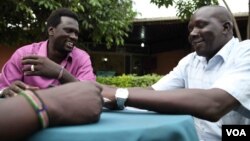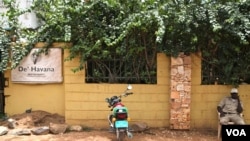JUBA — Plucked from a children's army in the 1980s as civil war raged in Sudan, some 600 South Sudanese boys were sent to Cuba to be educated. Returning as men to a newly independent country, they are keeping the Latino spirit alive as they help build a new nation.
Cuban Jubans
Clinking glasses of rum and coke, and chatting in flawless Spanish over salsa music, groups of South Sudanese regularly meet to chat, dance and be thankful that they escaped a war with the north that killed almost 2 million people.
Deng Aleer Leek, the owner of the De Havana nightclub where the so-called “Cuban Jubans” often congregate, says that the name is a small tribute to the island nation that saved hundreds from the ravages of war.
“It’s the only way I thought how to thank the people of Cuba," says Leek. "I went to school for so many years, and there were so many of us, and I did not pay nothing. So I have to pay them the name.”
Education
While in Cuba, Leek completed degrees in architecture, engineering and information technology.
But as communism waned in the 1990s, so did jobs and resources for Leek and former playmates who had become doctors, lawyers and engineers. The group again sought refuge elsewhere in North America.
Many of the Cuban Jubans have now returned home. But many have left their wives and children abroad as South Sudan is a nation with a reputation for being the most dangerous place to give birth and where only 10 percent of the population completes primary school.
But Leek and others say the sacrifice of being separated yet again from family and friends is the debt they owe to other South Sudanese whom had to stay … and die.
“I left so many friends on the floor, not even been buried," he says. "I have to build. And I explain to my son: be strong, let me work.”
Returning home
At a café outside Juba’s cultural center, Gatdet Thong meets with former child soldiers that he studied with in Cuba. They are trying to form a foundation for survivors of what was South Sudan’s “Red Army.” After earning degrees in law and plasmatology in the 1990s, Thong left Cuba and returned to southern Sudan, rejoining the movement fighting Khartoum.
But he says that a piece of his mind and soul stayed in Cuba, and he is determined to pass it on to future generations.
“Sali en la isla, pero mi corazon esta alla. That means I left the island, but my heart is still there," he says. "Yes, I do have quite an experience there. Why I come here, home? Just to support my people. I do understand that there’s no education during the struggle. As a citizen of this land, I dedicate myself to help them, to educate them, to show how people can work, how you can earn your living, how people can work healthy.”
Some South Sudanese proudly extoll this, calling it a “reverse brain drain.” They say the policy of taking children out of a troubled land to study in Cuba was a success because those children have acquired skills they brought back home.
On her last trip to South Sudan, Cuba’s outgoing ambassador, Clara Pulido Escandell, said that although the heyday of free education has passed, some South Sudanese will still benefit from scholarships in the future.
Cuban culture alive
In addition to seeing hundreds of former refugees becoming successes in their homeland, Pulido says that seeing the culture of her hometown Havana turning up in a landlocked, dusty African nation is a huge thrill.
“I have been there and it was very, very important when I visited the place for the first time," she says. "But when you are in a country which is not yours, you learn the culture, and this is also a very important issue to link countries. So they are overspreading the culture of Cuba also here in South Sudan. Dancing salsa, speaking Spanish, this is a very important point for the two countries.”
Back at De Havana club, Leek says that he will never stop trying to repay the islanders who saved him. Besides his nightclub business, Leek also runs a company building all-important roads to develop South Sudan. One day, he says, he will name a road after a place in Cuba, perhaps Bodeguita de Medio or Santiago.
Cuban Jubans
Clinking glasses of rum and coke, and chatting in flawless Spanish over salsa music, groups of South Sudanese regularly meet to chat, dance and be thankful that they escaped a war with the north that killed almost 2 million people.
Deng Aleer Leek, the owner of the De Havana nightclub where the so-called “Cuban Jubans” often congregate, says that the name is a small tribute to the island nation that saved hundreds from the ravages of war.
“It’s the only way I thought how to thank the people of Cuba," says Leek. "I went to school for so many years, and there were so many of us, and I did not pay nothing. So I have to pay them the name.”
Education
While in Cuba, Leek completed degrees in architecture, engineering and information technology.
But as communism waned in the 1990s, so did jobs and resources for Leek and former playmates who had become doctors, lawyers and engineers. The group again sought refuge elsewhere in North America.
Many of the Cuban Jubans have now returned home. But many have left their wives and children abroad as South Sudan is a nation with a reputation for being the most dangerous place to give birth and where only 10 percent of the population completes primary school.
But Leek and others say the sacrifice of being separated yet again from family and friends is the debt they owe to other South Sudanese whom had to stay … and die.
“I left so many friends on the floor, not even been buried," he says. "I have to build. And I explain to my son: be strong, let me work.”
Returning home
At a café outside Juba’s cultural center, Gatdet Thong meets with former child soldiers that he studied with in Cuba. They are trying to form a foundation for survivors of what was South Sudan’s “Red Army.” After earning degrees in law and plasmatology in the 1990s, Thong left Cuba and returned to southern Sudan, rejoining the movement fighting Khartoum.
But he says that a piece of his mind and soul stayed in Cuba, and he is determined to pass it on to future generations.
“Sali en la isla, pero mi corazon esta alla. That means I left the island, but my heart is still there," he says. "Yes, I do have quite an experience there. Why I come here, home? Just to support my people. I do understand that there’s no education during the struggle. As a citizen of this land, I dedicate myself to help them, to educate them, to show how people can work, how you can earn your living, how people can work healthy.”
Some South Sudanese proudly extoll this, calling it a “reverse brain drain.” They say the policy of taking children out of a troubled land to study in Cuba was a success because those children have acquired skills they brought back home.
On her last trip to South Sudan, Cuba’s outgoing ambassador, Clara Pulido Escandell, said that although the heyday of free education has passed, some South Sudanese will still benefit from scholarships in the future.
Cuban culture alive
In addition to seeing hundreds of former refugees becoming successes in their homeland, Pulido says that seeing the culture of her hometown Havana turning up in a landlocked, dusty African nation is a huge thrill.
“I have been there and it was very, very important when I visited the place for the first time," she says. "But when you are in a country which is not yours, you learn the culture, and this is also a very important issue to link countries. So they are overspreading the culture of Cuba also here in South Sudan. Dancing salsa, speaking Spanish, this is a very important point for the two countries.”
Back at De Havana club, Leek says that he will never stop trying to repay the islanders who saved him. Besides his nightclub business, Leek also runs a company building all-important roads to develop South Sudan. One day, he says, he will name a road after a place in Cuba, perhaps Bodeguita de Medio or Santiago.





